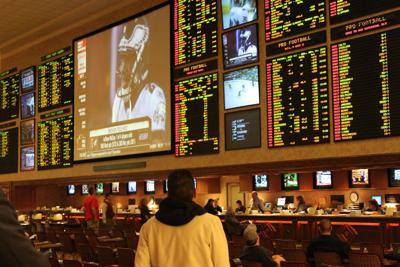BATON ROUGE—Lawmakers passed the final pieces Thursday to create sports gambling in the state, and it could start before the upcoming football season.
Gov. John Bel Edwards signed the first of the three bills last week, and the other two bills faced last-minute adjustments on the final day of the legislative session Thursday.
“We’re simply putting in place the rules and regulations for something that our constituents have told us they wanted,” Sen. Rick Ward, R-Lake Charles, said earlier in the debates.
Last fall, 55 of 64 parishes voted in favor of some form of sports betting, and over 64% of voters in the state approved the measure.
Ward and three other Republicans spearheaded the writing of how Louisiana would welcome legal wagering on sports events. Sen. Ronnie Johns, R-Lake Charles, and Senate President Page Cortez, R-Lafayette, authored the bills along with Rep. John Stefanski, R-Crowley, authored the bills and co-sponsored other measures.
Before the session, the looming decision for the state was to either mimic Mississippi’s approach and limit sports wagering to in-person bets placed in casinos or allow betting over the internet. States that have allowed online betting have seen more lucrative tax collections.
Louisiana chose to allow betting in-person or online and to allow bars and restaurants to have kiosks similar to video poker machines. The nine parishes that did not favor sports gambling will be “geofenced” out from participating in online wagering.
Kiosks allow local businesses a chance to collect funds from gambling and give residents in parishes without a casino easier access. The Louisiana Lottery will supervise the kiosks inside of retail establishments.
While other states have chosen to use their state lottery systems to enact sports betting, the decision was pushed by Cortez, the Senate President, and benefitted lobbyist Joel Robideaux, a friend and neighbor, according to The Advocate.
Robideaux, the former mayor of Lafayette and a former state representative, was working as a lobbyist on behalf of Intralot, a digital gaming operator and supplier to state lotteries.
Cortez and Robideaux had previously purchased land together in Lafayette Parish and attended the University of Southwestern Louisiana with each other.
The state will begin by granting 20 sport wagering licenses for which private companies can apply. The 16 land-based casinos and four racetracks will be first in line for the permits, followed by truck-stop casinos. The applications for the license vary in price, the costliest being a land-based application at $250,000 and a five-year license of $500,000.
Retail stores can expect to pay $10,000 for an application and $12,500 for a five-year permit. There is an annual fee of $15,000 for permit holders, the same as slot machines or video poker machines.
The state will also collect a 10% tax from the companies offering in-person gambling. The tax will be levied on the revenue made from betting minus the money paid out to winning patrons.
Online gaming companies will face a similar 15% tax.
Ward’s Senate Bill 142 attempted to divvy the tax collections into different funds for the state to use. There were several debates on the bill as other lawmakers wanted some of the funds for projects of their own.
The final agreement was 60% of the money going back to the state’s general fund and the rest to other reserves.
The Early Childhood Education Fund receives 25% of the collected money. Fantasy sports gambling, a separate form of betting that focuses on teams created by bettors who mix and match players from real teams, will deposit all of its revenue into the fund. Officials forecast that betting on fantasy sports also will start by the fall.
A 12% cut of the revenue from bets on real sports will be distributed back to the parishes where it was collected, and at least $500,000 will go into Behavioral Health and Wellness Fund, giving aid to gambling addicts. Two percent will go to the Disability Affairs Trust Fund.
The bill also gives 1% of the money to supplement thoroughbred and quarter horse racing purses in the state.
Off-track horse-racing betting parlors also received the ability to hold electronic gambling machines to wager on races through Senate Bill 209 written by Gary Smith, D- Norco. Supporters say it will benefit the horse racing industry.
It is not certain how much money the state will earn from allowing bets on sports. In a debate on the Senate floor earlier this month, Ward gave a hypothetical of $5 million.
Gamblers must be 21 years of age and located in the 55 parishes that approved the 2020 measure. Companies are not allowed to take bets on events in which most players are under 18 or on competitive video game contests.


Post a comment as anonymous
Report
Watch this discussion.
(0) comments
Welcome to the discussion.
Log In
Keep it Clean. Please avoid obscene, vulgar, lewd, racist or sexually-oriented language.
PLEASE TURN OFF YOUR CAPS LOCK.
Don't Threaten. Threats of harming another person will not be tolerated.
Be Truthful. Don't knowingly lie about anyone or anything.
Be Nice. No racism, sexism or any sort of -ism that is degrading to another person.
Be Proactive. Use the 'Report' link on each comment to let us know of abusive posts.
Share with Us. We'd love to hear eyewitness accounts, the history behind an article.